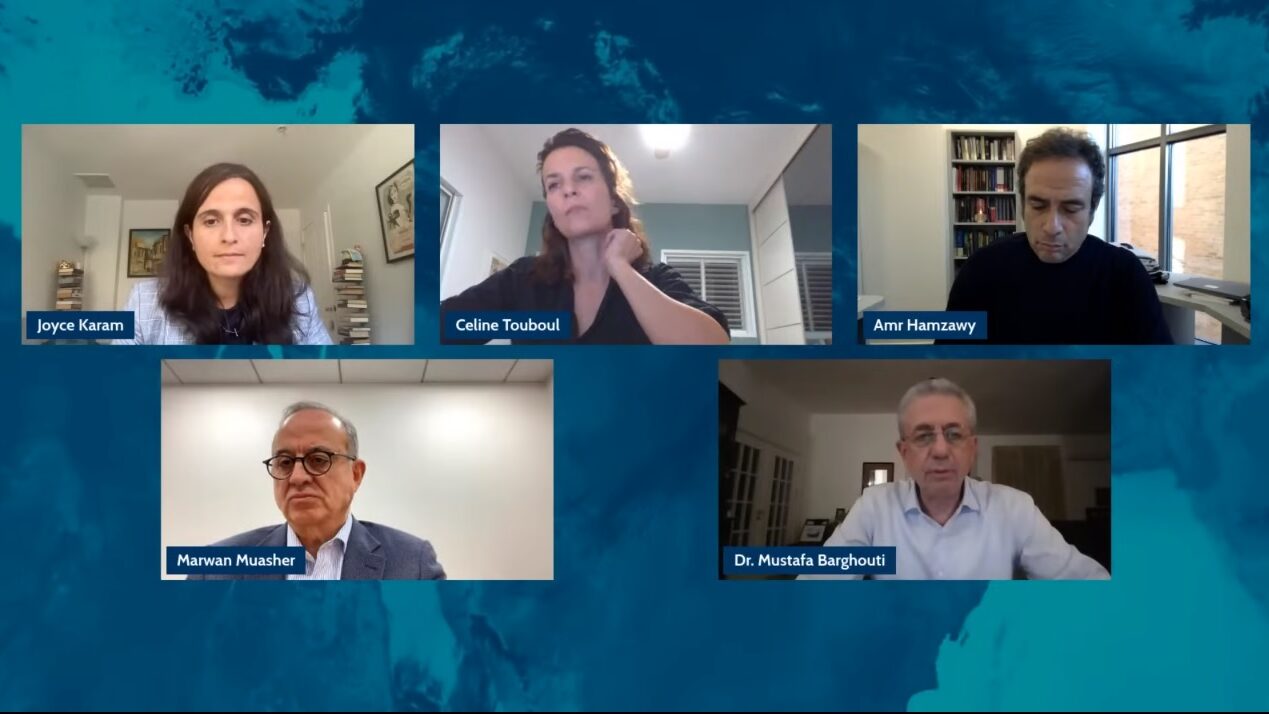Think Tank: Mass Transfer of Palestinian Refugees Would Change Egypt and Jordan’s National Fabrics
Panelists at a Carnegie Endowment event express concern over regional destabilization if Gaza conflict escalates.
Experts on a panel for the Carnegie Endowment for International Peace said Thursday that they fear “a mass transfer from Gaza to Egypt” and “from the West Bank to Jordan” of Palestinians may occur if things escalate much further in the region.
I am sure this will be a regional war. And this will create instability everywhere in the region,
“I am sure this will be a regional war. And this will create instability everywhere in the region. Is that what [US President Joe] Biden wants by just following what [Israeli Prime Minister Benjamin] Netanyahu tells him?” Dr. Mustafa Barghouti, a member of the Palestinian Legislative Council and Palestine Liberation Organization Central Council, asked.
Carnegie Endowment for International Peace hosted an event called The Israel-Hamas Conflict: What Comes After? The online briefing included four panelists. Joyce Karam, the senior news editor at Al-Monitor and adjunct professor at George Washington University, moderated. Israeli, Jordanian, Egyptian, and Palestinian experts were represented on the panel.
Barghouti, the only Palestinian on the panel, spent the first few moments of his allotted time negotiating with the moderator for more speaking time. “The BBC gives me more time,” he said before launching into his thoughts about the Israel-Hamas war.
The panel discussed, at length, displaced Palestinians and the possibility of them being dispersed throughout the region.
After Ukraine and after Syria, mass transfer of people is not something imaginary. It has happened.
“After Ukraine and after Syria, mass transfer of people is not something imaginary. It has happened. It has happened more than once,” Marwan Muasher, vice president for studies at Carnegie told those in attendance. Muasher served as Jordan’s foreign minister from 2002 to 2004 and then as its deputy prime minister in 2004 and 2005.
This holiday season, give to:
Truth and understanding
The Media Line's intrepid correspondents are in Israel, Gaza, Lebanon, Syria and Pakistan providing first-person reporting.
They all said they cover it.
We see it.
We report with just one agenda: the truth.


This may not seem too far-fetched, but there is a striking difference: Unlike the mass transfers mentioned, especially with Ukrainians who were placed throughout the world to escape that war, there are currently zero countries offering Palestinians reprieve by opening their borders to them.
The UN claims there are 1.4 million displaced persons in Gaza currently. Meanwhile, upwards of half a million Israelis are internally displaced due to the October 7 terrorist attacks that led to the current war.
Celine Touboul, the co–executive director of the Economic Cooperation Foundation, an Israeli policy-planning think tank, said that Netanyahu as “averse to big decisions, whether it is peace or war” and that he’s a “true believer in the status quo,” which she characterized as “an illusion that has led us to the kind of situation and deadlock that we have been seeing in the Israeli-Palestinian conflict for so many years.”
“Who told you that Egyptians would accept the resettlement of 2.5 million on our territory? Or that Jordanians are willing to see the nature of their social fabric changed drastically?” Amr Hamzawy, senior fellow and the director of the Carnegie Middle East Program, asked.
His rhetorical questions were aimed at the West and media who keep asking why Arab countries do not take in Palestinian refugees.
We are Egypt, first and foremost. We are an Arab country in solidarity with Palestine, but not at our expense.
“We are Egypt, first and foremost. We are an Arab country in solidarity with Palestine, but not at our expense,” Hamzawy said.
Palestinians have not been friendly to their other neighbors through the years, either.
“The concern is, and here we can really evoke several moments in the Arab past, we can go back to 1970 in Jordan, we can go back to 1982 in Lebanon, we can go back to 1991 post-liberation of the Kuwait war and the Madrid conference, there are concerns across the region about regional security arrangements following what’s happening in Gaza. It is clear that Gaza [issues] will not be contained to Gaza,” Hamzawy continued.
Hamzawy was referring to several incidents involving large populations of displaced Palestinians settled in other countries including two civil wars: Jordan’s Black September, where the PLO attempted to overthrow the king of Jordan, and the Lebanese civil war, in which the PLO took part.
In 1991, Kuwait expelled Palestinians when the PLO sided with Iraqi dictator Saddam Hussein after he invaded Kuwait. At the time, the PLO enjoyed a relationship with Kuwait comparable to the relationship Hamas leadership has with Qatar—cozy and lucrative.
Egyptians are not willing to risk it.
“[Egypt] will not let our national sovereignty or our borders be abused to solve an Israeli problem of not accepting a two-state solution, of not accepting an end to the occupation … our territory will not be abused to solve a problem which the occupying force created,” Hamzawy said.
The panel fully expects the situation to deteriorate when Israel enters Gaza.

